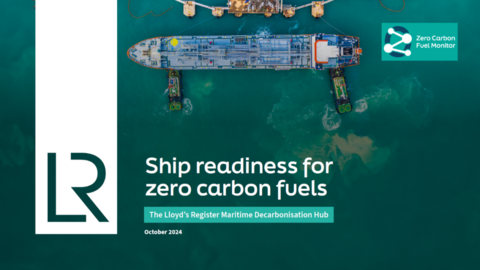
The latest update from the Zero Carbon Fuel Monitor shows substantial advancements in the state of ship readiness for new fuels and technologies over the last year.
Lloyd’s Register Maritime Decarbonisation Hub’s Zero Carbon Fuel Monitor (ZCFM) has highlighted rapid technological advances in handling, storing, and using alternative fuels onboard vessels that are enabling the maritime industry’s transition to zero (or near-zero) carbon fuels.
The latest ZCFM update focuses on the final stage of the fuel supply chain – the ship – and offers valuable insights into the readiness of current vessels for various fuel types including ammonia, biofuels (FAME and HVO), hydrogen, liquefied methane, and methanol
The report found that technology readiness levels for all reviewed fuels have increased over the past year. It identified 31 vessels in the existing fleet and orderbook capable of using ammonia, along with over 400 “ammonia ready” vessels, mainly in gas and bulk carrier segments. It also noted 315 methanol-capable vessels, with nearly 500 more classified as “methanol ready” and 78 hydrogen-capable vessels, primarily used in coastal and short-sea shipping.
The analysis also indicates a rise in commercial trials and applications, boosting the investment readiness levels (IRLs) within the ship supply chain stage. Community readiness levels (CRLs) are increasing, driven by growing awareness of the urgency to meet the International Maritime Organisation’s (IMO) 2030 interim target of achieving 5% of vessels running on low-to-zero carbon fuels.
While the report acknowledges progress, it also highlights areas needing further development and investment, such as improved safety protocols and crew training for handling alternative fuels, as well as challenges related to investment due to uncertainties in the supply chain, including fuel availability, port infrastructure, and regulatory frameworks.
Amelia Hipwell, Decarbonisation Innovation Manager in the LR Maritime Decarbonisation Hub, said: “The Zero Carbon Fuel Monitor offers a valuable overview of current vessel readiness for various fuel types, providing a clear perspective on the potential of these fuels to transform the shipping industry.
“With ongoing advancements in fuel handling, storage, and propulsion capabilities, the maritime sector is taking important steps toward the widespread adoption of zero-carbon fuels. While challenges remain, Lloyd’s Register’s Maritime Decarbonisation Hub is committed to supporting the maritime industry’s safe and sustainable adoption of zero and near-zero carbon fuels.”
Link to report: Ship readiness for zero carbon fuels report | LR





